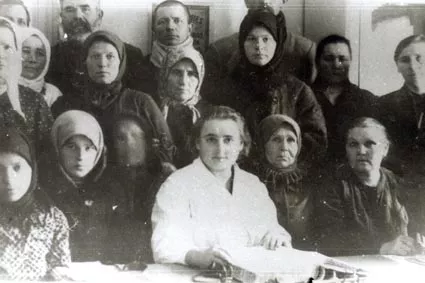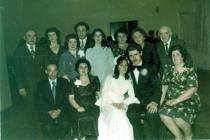This photograph was taken in 1939 in a small out-of-the-way Latvian village. I have no information about who had taken it. On the photograph you can see my aunt Rosa surrounded by her patients.
After the end of the war we returned to our native Riga in October 1945. We found city to change little. The synagogue was burned down. The same happened with the department store, where my father's furniture shop was situated. Population of Riga changed terribly: none of the Jews survived. All our relatives were lost. We know nothing about their death or about their burial places. We managed to learn (absolutely by accident) terrible truth about death of my aunt Rosa. Rosa Lifshits, nee Kravets was the elder sister of my mother. She was a doctor and worked in a small village in Latvia. All her life she lived among peasants, helped them to give birth, treated them medically, and shared all life severities with them. In 1949 after my son's birth I got ill with mastitis. A doctor from our polyclinic visited me and I recognized him to be a collaborator of my aunt Rosa Lifshits. He told me that at that time he ran away from Germans using a bicycle. He came to pick up Rosa and offered her to rescue together with him. She said that it was not necessary, because all local inhabitants were her patients. She was sure that they would stand up for her. Calmed down, the doctor left alone. Later it turned out that aunt Rosa was shot by Latvians (probably by her patients) even before Germans came.
Only our family and the family of my uncle Pinkhus (they were in evacuation in Tashkent) survived the war.
Here I'd like to tell about other siblings of my mother.
Mother had senior sister Rosa Hirsh-Leybovna Lifshits, nee Kravets. She was born in 1895 and died in 1941. She worked as a doctor in Latvia in a small village.
Another mother's sister was Sofiya (Basheve) Hirsh-Leybovna Kleener, nee Kravets. She never worked and was uneducated. She lived in Riga. Her husband had a furniture shop. When the war burst out, they did not manage to evacuate in time, because their children were sick with scarlet fever. Nobody knows when and how they were lost, and nobody saw them any more.
My Mum had four brothers. David Hirsh-Leybovich perished during World War I.
Lazar Hirsh-Leybovich was a furniture-maker. Before the war uncle Lazar sent his wife and two children to his mother-in-law to a small town situated close to the Soviet border.
Uncle Lazar went to evacuation together with us in the same train carriage. Our train went by that town, where his family stayed. He decided to leave the train and try to find them and save. But he did not even reach his family: he got the lead on his way. And his wife, children and mother-in-law were also shot by Germans. We got to know about it only in 1945 from the letter of their neighbor.
Borukh Hirsh-Leyboich, his wife Sonya and two children Ekhiel and Dovid visited us rarely. We were not good friends. They did not regard us with favor: we were poor relatives for them. When the war burst out, uncle Borukh came to ask advice from my father: all our relatives acknowledged him as worldly wise. Above the table of my sister a portrait of Lenin 2 hung. Uncle Borukh advised to take it off immediately. We never saw anybody of uncle Borukh's family again.
Pinkhus Hirsh-Leybovich was born in 1912. He survived during Holocaust, because he managed to evacuate together with his wife Sonya and two daughters Mirra and Fruma. He died in Riga in 1988 from heart attack. He worked as a furniture-maker. In contrast to my father he was skilful in writing reports in Russian. Daddy was envious of him, he said 'You see, he is talented from birth.'
My daddy disliked the Kravets (mother's relatives), but tried to be on good terms with them. Pinkhus and Lazar often visited us, and we did the same. Aunt Sonya (my mother's sister) lived rather far from us, therefore we met her not very often. There were a lot of occasions to meet our relatives: we celebrated together not only family holidays, but also Jewish ones.

























